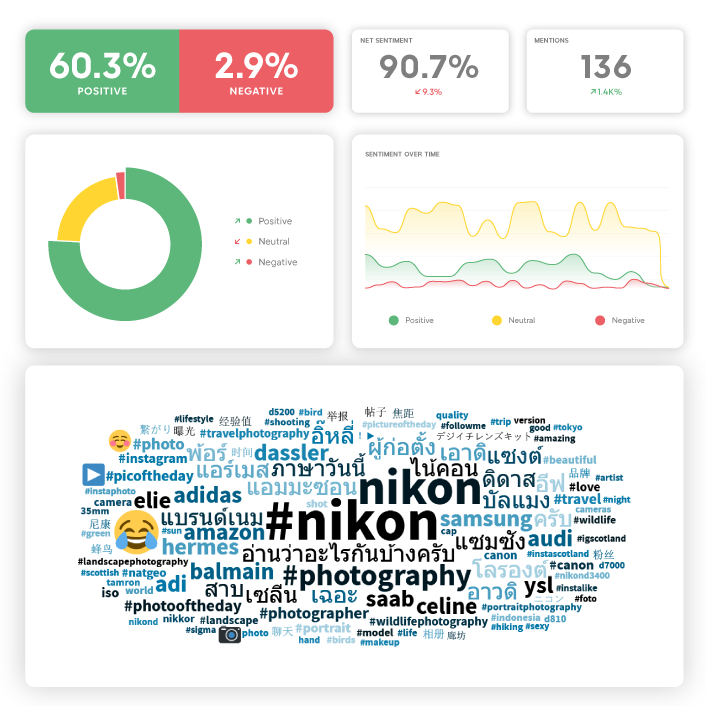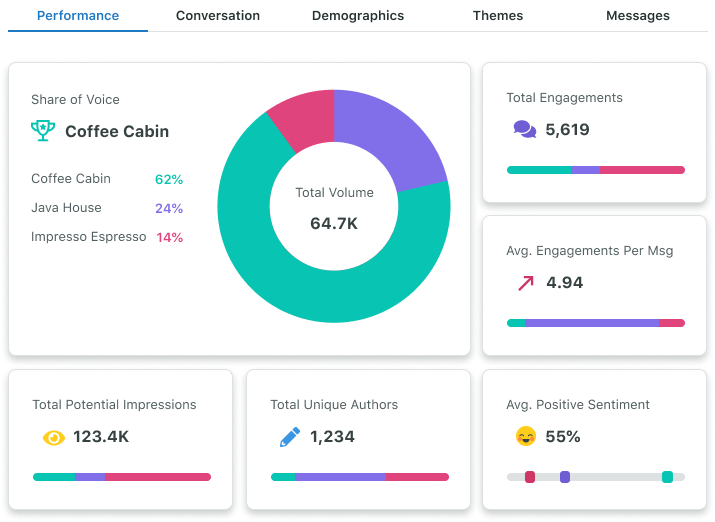In the fast-paced digital era, social media platforms have become a treasure trove of valuable information. From customer preferences and feedback to market trends and competitor analysis, social media holds a wealth of insights for businesses aiming to stay ahead of the curve. However, the sheer volume of data can be overwhelming without a systematic approach. This is where social media listening analyst step in.
The Role of a Social Media Listening Analyst

A social media listening analyst plays a vital role in transforming raw data into actionable intelligence. They possess a unique blend of technical skills, business acumen, and analytical prowess. Let’s delve into the essential responsibilities and activities performed by a social media listening analyst:
1. Gathering and Analyzing Data
The first step for a social media listening analyst is to gather data from various social media platforms using specialized tools. They monitor brand mentions, keywords, and relevant topics to collect a wide range of conversations. Once the data is collected, it undergoes a meticulous analysis to extract meaningful insights.
2. Identifying Trends and Patterns
Social media listening analysts identify emerging trends, patterns, and themes from the collected data. They analyze user sentiment, engagement levels, and conversations around specific topics to uncover valuable information. By recognizing patterns, analysts can help businesses understand what resonates with their target audience and adapt their strategies accordingly.
3. Extracting Actionable Insights
The true value of social media listening lies in the ability to extract actionable insights. Analysts scrutinize the data to identify opportunities, risks, and areas for improvement. They provide strategic recommendations based on their findings, empowering businesses to make informed decisions and optimize their marketing, product development, and customer experience strategies.
4. Collaborating with Stakeholders
Social media listening analysts collaborate closely with stakeholders across various departments. They work with marketing teams to refine campaigns, product teams to enhance offerings, and customer support teams to improve user experiences. By fostering collaboration, analysts ensure that insights are effectively translated into actionable steps.
5. Ensuring Data Privacy and Ethical Practices
Social media listening analysts adhere to strict privacy and ethical guidelines as custodians of sensitive user data. They ensure that data collection methods are compliant with regulations and industry standards. By upholding ethical practices, analysts build trust with users and mitigate the risk of data breaches or misuse.
Tools and Technologies for Social Media Listening
Social media listening analysts employ a wide range of tools and technologies to streamline their work and extract insights efficiently. These tools include:
- Social media monitoring platforms (e.g., Brandwatch, AIM Insights, Sprout Social)
- Sentiment analysis tools
- Data visualization software (e.g., Tableau, Power BI)
- Natural language processing (NLP) algorithms
- Social media listening APIs
By leveraging these tools, analysts can navigate the vast landscape of social media data and distill it into meaningful information.
The Benefits of Social Media Listening Analysis

Social media listening analysis offers several benefits to businesses seeking growth and success:
- Customer Insights: By monitoring online conversations, businesses can gain a deeper understanding of their customers’ needs, preferences, and pain points. This enables them to tailor their offerings and improve customer satisfaction.
- Competitive Intelligence: Social media listening helps businesses keep tabs on their competitors. By analyzing their strategies, strengths, and weaknesses, companies can identify opportunities for differentiation and stay one step ahead.
- Brand Reputation Management: Social media listening analysts help businesses maintain a positive brand image. By monitoring mentions and sentiment, they can address customer concerns promptly and mitigate potential crises.
- Campaign Optimization: Insights derived from social media listening analysis aid in refining marketing campaigns. By identifying successful tactics and adjusting strategies in real time, businesses can maximize the impact of their campaigns.
- Market Research: Social media listening provides businesses with real-time market research. By analyzing conversations around specific topics or product categories, companies can uncover emerging trends, consumer preferences, and market gaps.
Challenges Faced by Social Media Listening Analysts
While social media listening analysis offers numerous benefits, it comes with its own set of challenges. Some common hurdles faced by social media listening analysts include:
- Data Volume and Velocity: The vast amount of data generated on social media platforms requires sophisticated tools and techniques to handle it effectively.
- Data Quality and Noise: Social media data can be noisy and contain irrelevant or misleading information. Analysts must filter out the noise and focus on reliable data sources.
- Language and Context: Understanding language nuances, slang, and cultural references across different demographics and regions can be a challenge. Analysts need to account for these variations to extract accurate insights.
- Data Privacy and Compliance: Social media listening analysts must navigate the ethical and legal aspects of data collection, storage, and usage to protect user privacy and comply with regulations.
Future Trends in Social Media Listening Analysis
The field of social media listening analysis continues to evolve, driven by advancements in technology and changing consumer behavior. Some emerging trends include:
- Artificial Intelligence (AI): AI-powered algorithms and machine learning models enhance the accuracy and efficiency of social media listening analysis. They enable analysts to process vast amounts of data and derive insights at scale.
- Real-time Monitoring: With the increasing demand for real-time insights, social media listening tools are becoming more agile and capable of monitoring and analyzing conversations as they happen.
- Multichannel Analysis: Social media listening analysis is expanding beyond traditional platforms. Analysts now incorporate data from messaging apps, forums, and other online communities to gain a holistic view of customer sentiment.
- Predictive Analytics: By leveraging historical data and machine learning, social media listening analysts can predict future trends, consumer behavior, and potential crises. This enables businesses to proactively strategize and stay ahead of market shifts.
Case Study: How Social Media Listening Transformed Customer Engagement and Market Positioning
In this digital age, customers are moving to the social media and digital platforms more. So the businesses are trying to cover this move, and work on providing their services online. But the need of the social media insights is increasing by the brands. To be able to understand their customers better and have a full understanding for the customers needs.
The Challenge: Extracting Actionable Insights from Social Media Data
The company was facing some challenges that were hardening the use of social media.
- Overwhelming Data Volume: The brand had thousands of conversations on social media every day, which was hard to filter.
- Rising Negative Sentiment: The customers were complaining about customer services and after-sales support.
- Competitor Benchmarking Gaps: The company was struggling in analyzing the competitors strategies. Which was difficult to identify eares of improvement they can take.
- Delayed Response to Customer Issues: Without having real-time monitoring for the social media, the customers’ concerns were addressed late.
The Solution: Implementing a Social Media Listening Strategy
To address all these challenges, the company decided to adopt a social listening strategy.
- Data Collection and Sentiment Analysis
- They depended on a social media listening tool to track the social media mentions and any new trend that occurs.
- Used a sentiment analysis system to categorize the feedback into positive, negative, and neutral.
- Identified customers’ concerns and complaints to work on solving them faster.
- Competitor Analysis and Market Intelligence
- They analyzed different metrics of the competitors, including their customers’ engagement and brand position in the market.
- Discover that competitors are depending on eco-friendly and sustainable material. Which was attracting the customer’s satisfaction.
- Identify the pricing and promotional gaps that could be used for differentiation.
- Real-Time Customer Engagement
- They applied a real-time alert system to detect negative feedback and sentiment.
- Formed a social media response team to respond to the customers’ complaints faster.
- Integrating AI-powered chatbots to be able to respond to the common queries of the customers faster.
- Data-Driven Product Development
- The insights that were gathered from social media were shared with the team to work on them.
- The common concerns by the customers led to redisgeing some product for matching the customers needs.
- Launching a testing program, which allows the customers to give feedback on the new products before launch.
The Results: Business Transformation Through Social Media Listening
- Enhanced Brand Sentiment: The positive sentiment of the company increased by 40%. While the negative sentiment decreased by 30%.
- Faster Customer Response Time: The responding time on social media went from 8 hours to 2 hours.
- Sales Growth: The improvement in product quality led to an increase in sales by 20%.
Competitive Differentiation: By integrating a new eco-friendly line in the production, the company attracted a new customer segment.
Conclusion
In conclusion, social media listening analysis has become an indispensable tool for businesses aiming to thrive in the digital landscape. By harnessing the power of social media data, businesses can uncover valuable insights, enhance customer experiences, and drive strategic growth. To experience the benefits of social media listening analysis firsthand, request a demo from AIM Technologies, a leading provider of advanced analytics solutions.
FAQs
What qualifications does a social media listening analyst need?
- A social media listening analyst should have a strong foundation in data analysis, marketing, and communication. Proficiency in social media analytics tools and a keen understanding of consumer behavior are also crucial.
Which industries can benefit from social media listening analysis?
- Virtually all industries can benefit from social media listening analysis. From retail and hospitality to healthcare and finance, understanding customer sentiment and market trends is valuable across the board.
How often should social media listening analysis be conducted?
- The frequency of social media listening analysis depends on the business’s goals, industry dynamics, and the volume of social media conversations. Regular monitoring is recommended to stay up-to-date with the latest insights.
Can social media listening analysis help with crisis management?
- Absolutely. Social media listening analysis allows businesses to detect potential crises early on by monitoring negative sentiment and mentions. This enables prompt response and effective crisis management.
How can businesses ensure data privacy when conducting social media listening analysis?
- Businesses must prioritize data privacy by using secure data collection methods, anonymizing user information, and complying with relevant data protection regulations. Transparency and consent are also key factors in maintaining data privacy.




